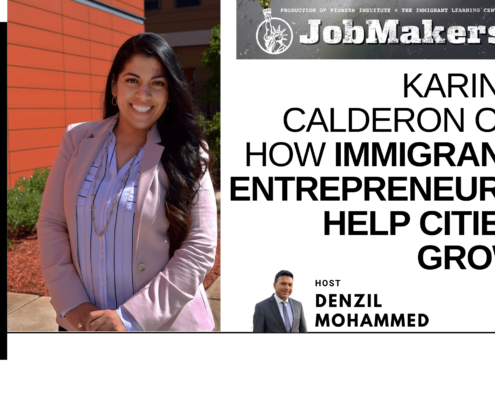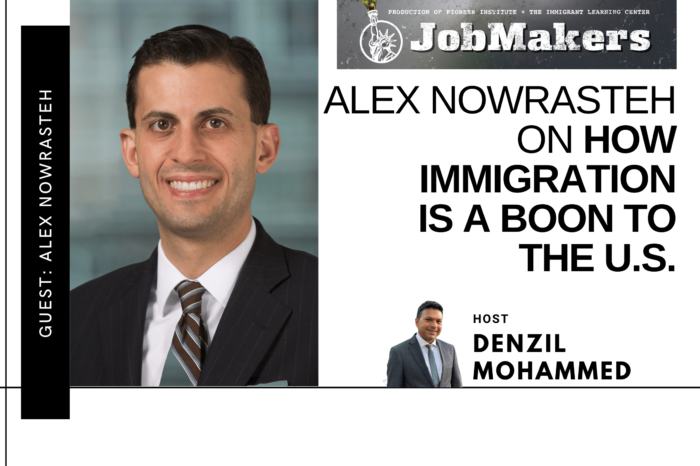Alex Nowrasteh on How Immigration Is a Boon to the U.S.
/in Economic Opportunity, Featured, JobMakers /by Editorial StaffThis week on JobMakers, host Denzil Mohammed talks with Alex Nowrasteh, the Cato Institute’s director of immigration studies and author of “The Most Common Arguments Against Immigration and Why They’re Wrong.” In part one of this conversation, Alex laid out the facts for us on immigration in the U.S., countering many of the false narratives we hear on topics such as public safety and political leanings. This week, Alex hones in on a fact that research has consistently found: that immigrants benefit Americans. And, based on his many years of speaking on this topic to anti-immigrant audiences, he provides insight on where anti-immigrant arguments really come from, as you’ll find out in this week’s JobMakers.
Guest:
 Alex Nowrasteh is the director of immigration studies and the Herbert A. Stiefel Center for Trade Policy Studies. His popular publications have appeared in the Wall Street Journal, USA Today, the Washington Post, and most other major publications in the United States. His peer-reviewed academic publications have appeared in the World Bank Economic Review, the Journal of Economic Behavior, Organization, Public Choice, and others. Nowrasteh regularly appears on Fox News, MSNBC, Bloomberg, NPR, and numerous television and radio stations across the United States. He is the coauthor (with Benjamin Powell) of the book Wretched Refuse? The Political Economy of Immigration and Institutions (Cambridge University Press, 2020), which is the first book on how economic institutions in receiving countries adjust to immigration. He is also the coauthor (with Mark S. Krikorian) of the booklet Open Immigration: Yea and Nay (Encounter Broadsides, 2014) and has contributed numerous book chapters about immigration to various edited volumes. He is a native of Southern California and received a BA in economics from George Mason University and an MS in economic history from the London School of Economics.
Alex Nowrasteh is the director of immigration studies and the Herbert A. Stiefel Center for Trade Policy Studies. His popular publications have appeared in the Wall Street Journal, USA Today, the Washington Post, and most other major publications in the United States. His peer-reviewed academic publications have appeared in the World Bank Economic Review, the Journal of Economic Behavior, Organization, Public Choice, and others. Nowrasteh regularly appears on Fox News, MSNBC, Bloomberg, NPR, and numerous television and radio stations across the United States. He is the coauthor (with Benjamin Powell) of the book Wretched Refuse? The Political Economy of Immigration and Institutions (Cambridge University Press, 2020), which is the first book on how economic institutions in receiving countries adjust to immigration. He is also the coauthor (with Mark S. Krikorian) of the booklet Open Immigration: Yea and Nay (Encounter Broadsides, 2014) and has contributed numerous book chapters about immigration to various edited volumes. He is a native of Southern California and received a BA in economics from George Mason University and an MS in economic history from the London School of Economics.
Get new episodes of JobMakers in your inbox!
Read a Transcript of This Episode
Please excuse typos.
Denzil Mohammed:
I’m Denzil Mohammed, and this is Jobmakers.
Denzil Mohammed:
In the last episode of Jobmakers, we began a very enlightening conversation with the Cato Institute’s Alex Nowrasteh, their director of immigration studies and a regular immigration commentator on Fox or other news outlets. He’s compiled a great booklet that you can download for free at cato.org or libertarianism.org called, The Most Common Arguments Against Immigration and Why They’re Wrong. Last time, Alex laid out the facts for us on immigrants and immigration in the U S countering. Many of the false narratives we’ve been fed all our lives and our ancestors fed facts like public safety has increased as immigration to the U S has increased immigrants. Aren’t a lot for the democratic party as immigration increased. So did American prosperity this week, Alex hones in on a fact that research has consistently found that immigrants benefit Americans, and even his many years of speaking on this topic to anti-immigrant audiences, he gives us his insight on where anti-immigrant arguments come from. As you find out in this week’s job makers, Where does all this misinformation or disinformation come from? I spoke to professor James witty from George Mason university’s Institute for immigration research, and he made very clear that there’s something called misinformation and there’s something called disinformation. And you mentioned names like Mark Krikorian and Ann Coulter, who I would argue are possibly spreading disinformation, actively doing that. People are being fed certain messages in their minds. And if they believe certain things as facts, for instance, the crime where does it come from? You’ve been talking to this audience for a long time.
Alex Nowrasteh:
I think it comes from a many different places. I think part of it is people focus on anecdotes and they don’t focus on data. So they’ll look at the newspaper and talk and see some horrible crime committed by somebody who is an immigrant, and they focus on that. They don’t look at the data behind it, and we do that with everything, by the way, it’s, it’s a real problem with, with human cognition and perception, it’s a big systemic problem. So I think that really sort of pollutes this debate, a lot of people focus on anecdotes and not on those cases. I think some of it also comes from the way that our brains are hardwired. So you know, our ancestors grew up in caves, on the savannas of Africa and other places. And they evolved for that kind of environment where resources are fixed.
Alex Nowrasteh:
You know, there’s only so many Buffalo running around that we can hunt the feed ourselves and our family. So in that kind of environment where resources are fixed, a new person coming in or a new group really does lead to a decrease in resources for everybody really does make, you know, your group poor. And so you view outsiders with suspicion. You view new people where suspicion it’s a dangerous thing, but we live in a modern world. We have free markets, we have trade, we have capitalism, we have pot, what’s called positive some growth. Like people are creators. We create things. We’re not just taking the animals from the environment to eat or clothing ourselves. We’re making goods and services from, from raw materials and from the ingenuity of the human brain. And so what’s happened is our minds are just not evolved. Our economy has evolved faster than our minds have kept up.
Alex Nowrasteh:
And as a result of that, we have a very primitive mindset where we just see people, you know, new people whether they’re from abroad or whether they’re births or whatnot, as taken away from us. And it’s a primitive mindset, it’s an incorrect mindset. And I think part of it is a lot of people who are anti-immigrant, don’t actually want to tell you why, or they don’t actually know why – they just don’t like foreigners. And they look for a reason to justify why they don’t like foreigners and they go down this list. So one of the things that I’m worried about is they might say, I don’t like immigrants because they take our jobs and lower wages and I respond to that. And then they go on to the next stage when well, immigrants are going to take welfare and I respond to that and they go, well, they’re going to be criminals and terrorists and whatever.
Alex Nowrasteh:
I go down the list and I worry that I’m not actually responding to the real reason. They’re just giving me what they think are acceptable reasons. And so we’re doing this whole long song and dance where we’re not really responding to what the other person to say or really thinking. And that’s just a horrible, difficult way to talk about it. I mean, I suspect that a lot of the reason why people don’t like immigrants is they just don’t like foreigners. And it’s really, really hard to say that without sounding, you know, like a xenophobe and people don’t want to sound like xenophobes, you mean people who don’t like immigrants, right? And so it makes it impossible to have this discussion. So in a way it’s sort of like political correctness and patriotic correctness, which is like the right variety, makes it very difficult to have an honest conversation about immigration.
Alex Nowrasteh:
But I will say, I think there’s, there’s one thing that people don’t talk about very much, I think matters a lot. And this is chaos. I think most people dislike and hate chaos, and they view our immigration system. They view what happens on the border. They view all this stuff as chaos and people see, they become immediately turned off. They hate it and they want to clamp down. And whatever that chaotic thing is, you see it with the drug war you see with crime, you see with everything else. And so, as long as we have sort of a chaotic border, people are going to be really upset about immigration. Even though the border has very little to do with the total immigration debate. It’s a very small feature of it, but people sort of it bleeds over on everything else. But the catch 22 is we can’t get control of the border until we let more people in legally, but we can’t let more people in legally until people think that there’s no chaos on the border
Denzil Mohammed:
With a focus on the border and the border only, you know, we know visa overstays for instance, traditionally account for more on authorized immigration in the U S there’s no focus on that. Legal immigration is a huge deal. People getting their green cards, being naturalized every year, entering all workforce. There’s no focus on that. But focusing on the chaos is what has engendered this kind of disposition among people. And he brought up the idea of anecdotes versus data and research. The border individual crimes, alleged rape in Virginia, Virginia high school, things like that. Those are the things that people remember. They don’t remember the 13.7% of the us population is foreign born there. They still believe in what they hear, that it’s an invasion and an infestation. It’s probably closer to 50% doubting the census numbers because somehow the census may be biased. We’re up against a lot here, Alex. So I don’t envy your work at all.
Alex Nowrasteh:
Oh, that’s, it’s a challenge. I mean, what’s interesting is the late economist Alberto Alesina did a bunch of surveys and Europe in the United States. And one of the questions he asked, he just asked about some factual questions. First. He was like, what percentage of the population is foreign born? What percentage are immigrants, et cetera. And then he asked them what they thought about immigration policy. And one of the things he found is that people who are very opposed to immigration policy, immigration and immigrants just greatly exaggerate the percentage of the population that’s foreign born. I mean, they will exaggerate by like a factor of three or four. So they’ll think like the immigrant population is 60% when it’s really like 14. And it’s like, so people are not just like wrong and misperceiving things. They are like twisting their view of facts, the fit that, I mean, there is no city in America where it’s 60% foreign born, right? Like the largest is about 40, like just over 40% and Miami and, and they to be wrong by 50% upwards from that shows a level of like twisting reality to fit your partisan biases. To an extent that is, is, is sort of like worrying
Denzil Mohammed:
One of the difficulties in doing research on immigration. You know, you pointed out earlier that they don’t ask your immigration status when you go to court when, when you you’re picked up for something it’s difficult to equate to, to show that immigration causes certain things, for instance, economic revitalization of all the Metro areas since the sixties, it’s because immigrants moved in why is it so difficult as you, as a researcher and so many others out there to parse out definitively about immigration?
Alex Nowrasteh:
So part of the problem is there’s a lot of things going on, right? So immigrants, just to give you an example, you know, they increase the supply side of the economy, you know, more workers increased supply side, because that means more things can be made. There’s more sort of like productive resources in the United States, but is that causing all the increase or is the demand for these workers, right? The man for all these, you know, by, by an inherently growing us economy is the demand what’s causing that. And then the immigrants are just going to the demand and then the rising together. So like what’s causing that. It’s just really hard to parse that it’s what economists called causal inference, which is trying to tease out what causally happens there. And what we do is we can tell this, we can definitely find that demand plays a big role, right?
Alex Nowrasteh:
People are coming to the U S because wages are high and they’re much more productive here. But after the immigrants get here, they increase productivity. They increase the wages of native born Americans, because immigrants are not just workers. They’re also consumers. They buy things. And by buying things, that’s more customers. And having more customers means that American workers who are supplying these goods and services, new customers become more productive because the prices go up for these goods and services. And it’s just like this miraculous new thing. Like what we see across economies around the world is more people means more productivity, more people, making things, more people buying things. And the measure of your wealth is how many things and goods and services you have access to. It’s not the number on your bank account, right? It’s how many things you can get with that number in your bank account.
Alex Nowrasteh:
And immigrants increase the supply of stuff dramatically. And that’s something that we just, I think lose sight of. But the evidence is overwhelming. I mean, even George [inaudible], who is the most skeptical of immigration of the benefits in the United States of any economists around who is published in the peer rework, even he admits using the evidence in the way that he dies and sort of like, and through his sort of analysis, immigrants increase the amount of production in the United States by somewhere around one quarter to one half of a percentage point of GDP. So you’re talking about 60, you know, between like 60 in 60 and $90 billion, a in additional stuff made by native born Americans just by immigrants. Being here does not include at all though, roughly 12 to 15% of GDP that immigrants produced in themselves, but they just make Americans more productive by being here. So
Denzil Mohammed:
It’s used like economics, labor manufacturing, but then you get into also things like housing, housing values, you know even crime. We look at the preponderance of evidence and we see that there is some sort of relation. Even though we can’t say directly some immigration causes X or Y and with the crime, immigration goes up, crime goes down immigrants move into areas with low rent, over a generation. They build up storefronts, they get safer sidewalks. They start bringing in customers for, to the nail salons, things like that.
Alex Nowrasteh:
If you look to the places where immigrants go, you see this happening, right? You, you, you don’t see immigrants going to places in West Virginia or in Eastern Kentucky or other places that are suffering. And, you know, part of the reason not going there as those places doing poorly, but those pieces are also doing poorly because immigrants on-going there and they can’t make these investments. They can make you know, these investments in public safety or start new businesses. They’re going to places you know, when cities and suburbs around the country that are growing well and making a positive contribution.
Denzil Mohammed:
I remember just go where the jobs are. I mean, that’s why suddenly immigrants are going to the Dakotas. They never went there before. They’re going to Nebraska in meat, packing plants, they’re filling incredible voids. And we saw that a lot during the pandemic in terms of things like agriculture and food supply immigrants, almost 50% of our agriculture workers. Like what would we have done? How, what position would we have been in without that massive disproportionately large essential workforce? And in terms of agriculture and other areas, many of them are undocumented, right?
Alex Nowrasteh:
Yeah. Many of them are you know, an authorized immigrants and a lot of these places. I mean the most mobile immigrants in the U S economy that is willing to move from one area to another, at the drop of a hat are usually on authorized or unlawful immigrants in the United States. And that is something that’s really you under appreciated is that having this large mobile workforce is, is something that is, is dramatic. I mean, dramatically positive. I didn’t want to. And one of the interesting is because of the pandemic, you know, many of us had to work remotely for a while during the pandemic, a lot of white collar workers had to work remotely. And if it weren’t for the large number of H1B, visa holders, you know, highest, skilled, temporary workers, many of whom worked in it making that possible for us, it would have been much harder for a lot of sort of mid range and higher income people to work remotely.
Alex Nowrasteh:
Right. They’re able to, so imagine like the world you know, without these hundreds of thousands of H1B workers already working here in the United States, making it services more available to American firms, a lot of smaller businesses probably would’ve shut down entirely. A lot of big companies would have had a lot of trouble if not, had to shut down entirely, or they would have had an outsource all these services to, to other countries around the world. And we didn’t have to do that nearly as much because we have such a large, large pool of talented workers on the H1B visa
Denzil Mohammed:
Because we attract and hopefully retain talent. I might, I just add, we are recording this podcast over zoom and we have a high skilled immigrant to thank for that. You’re from Southern California. You live in DC. Now you sound pretty American to me, but you have your own sort of immigration story, don’t you?
Alex Nowrasteh:
Yeah. I mean, the thing is we all do as Americans. I mean, just about a hundred percent of us have an ancestor. And the last several centuries who came here from somewhere else my paternal grandparents immigrated from Iran in the late 1940s. My father was born here and Wisconsin, so he’s a slide tall, dark smarty guy who looks Iranian, who talks with a slightly Oshkosh accent. It’s kind of hilarious. And I moved to LA to work in the film business. My mother’s family has been here, you know, the first one in their family came into 16, late 16 hundreds, but then some you know, left, went to Canada, came back, others came from Europe, you know, French Jews from Europe, Germans, you know, basically a whole mass of like Western European Jews and Protestants coming over at different times.
Alex Nowrasteh:
And then, you know, they both grew up in the Midwest and then moved to California to work in the film industry, Matt out here. And then, you know, my brother and I, you know, we’re technically like, I guess third generation because you know, the stuff that we grew up in, but I mean, but I don’t speak Farsi. You know, I’ve never been to Iran. I eat the food every once in a while, but frankly I eat Italian food more so in Mexican food, more and Thai food more and Chinese food more. So that’s just like, you know, I’m really just like this American mutt with a really hard to pronounce last name. And basically people view me as like ethnically ambiguous, which, you know, I’m fine. I guess I am ethically ambiguous. That’s being an American and my labor on this issue. It’s not a labor born of personal experience.
Alex Nowrasteh:
Like I grew up around lots of immigrants in Southern California. That’s the norm to me, it feels great. But I don’t have a personal experience or something troubling that happened to me. It’s partly because I’m sort of a patriotic American, and this is something that really makes America different. And because of my background as a social scientist, because immigration is so fascinating. And because immigration is something where if we’re able to liberalize it in the United States allow more legal immigrants to come in. It’s worth tens of trillions of dollars to our economy in the world that,
Denzil Mohammed:
And plus the access to Thai food and Mexican food and Italian food and Chinese food, which we are so lucky to have in the U S because of immigration we take for granted all these things that we’re afforded that people at other countries aren’t, and we have this, this buffet, the smorgasbord of things to choose from every single day, because that’s what immigration gave us. So people can download the most common arguments against immigration and why they’re wrong. It’s a really beautiful read. It’s very visual, nothing is complex. The stated it’s free to download. You can get it@libertarianism.org and also on the institutes website any glass comments about this particular project.
Alex Nowrasteh:
So, you know, this project is the combination of over a decade of my work and research on this, you know, bringing together tens of thousands of different pages of research written by other scholars and doing original research myself. So if you want to see the highlights of what I’ve learned on this topic for a long career, with only spending, maybe 20 minutes of reading, this is the thing for you to get. I highly recommend it. So please, you know, check it out, download it. And if you have any questions or other follow up, send me an email and you can find my email on Cato’s website@cato.org.
Denzil Mohammed:
And soon I’m going to be talking to one of your colleagues, your hand, Norberg the author of open the history of human progress, and which I think we will explore some of these themes further. Alex Nowrasteh. Thank you so much for joining us and job makers.
Alex Nowrasteh:
Thanks a lot for having me. It was a real pleasure
Denzil Mohammed:
Jobmakers is a weekly podcast about immigrant contributions issues and research produced by pioneer Institute, a think tank in Boston and the Immigrant Learning Center in Malden, Massachusetts, a not-for-profit that gives immigrants a voice. Got comments, questions, know someone we should talk to? Email Denzil – that’s D E N Z I L at jobmakerspodcast.org. Thanks for joining us for this week’s revealing discussion on how immigrants benefit all of us next Thursday at noon, we’ll meet one of those immigrants. Carlos Castro, his businesses in Virginia have employed hundreds of people over decades. A far cry from his humble beginnings in El Salvador, where there was no such opportunities as you learn in the next Jobmakers podcast.
Recent Episodes:
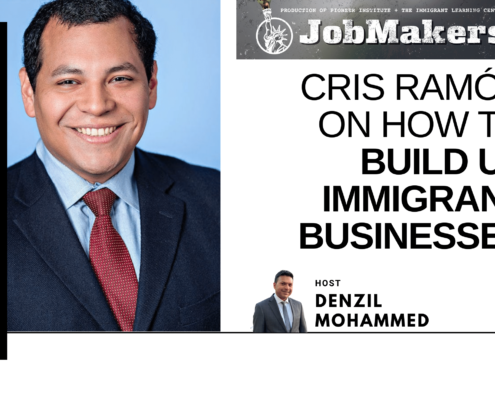
Cris Ramón on How to Build Up Immigrant Businesses
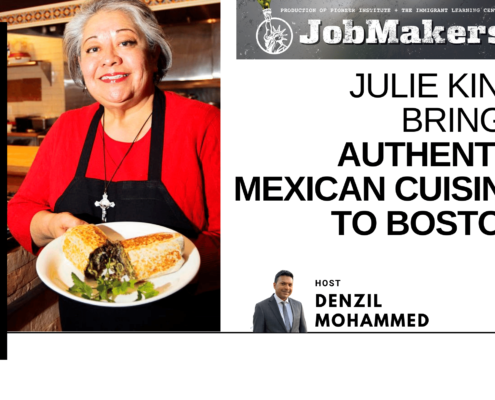
Julie King Brings Authentic Mexican Cuisine to Boston
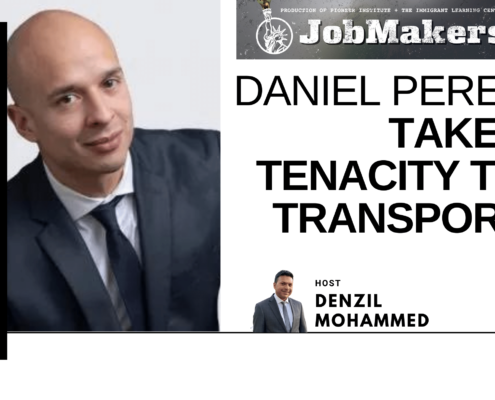
Daniel Perez Takes Tenacity to Transport
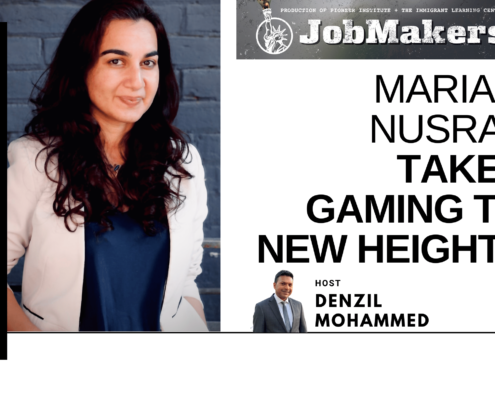
Mariam Nusrat Takes Gaming to New Heights
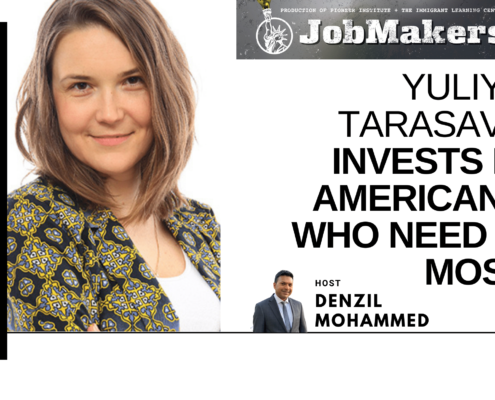
Yuliya Tarasava Invests In Americans Who Need It Most
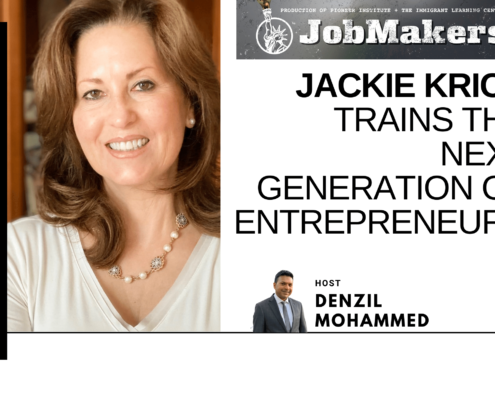
Jackie Krick Trains the Next Generation of Entrepreneurs
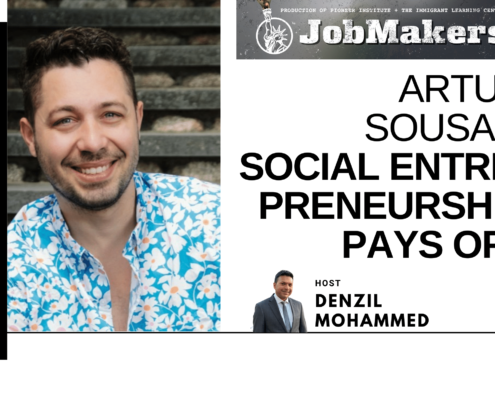
Artur Sousa’s Social Entrepreneurship Pays Off
